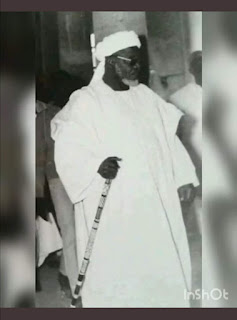Sheikh Inyass RTA contribution to Nation building and emancipation of Africa.
Sheikh Ibrahim Niasse RA was born on the 8th November, 1900, this was a period of peak french colonial yoke on franco-phone Africa. As a Man with an acute awareness of the necessity of the Socio-economic and political emancipation of the continent, he sought spiritual upliftment to fascilitate political emancipation.
In his seminal treaties, 'Ifriqiya Lil Ifriqiyeen' (Africa for Africans), he's renowned for the following proclamation:
'We are the people of Africa, so Africa belongs to us, and we belong to Africa. Sooner or later every nation will come to be governed by its children whatever the schemes of the enemies of the African citizenry. A current of freedom and nationalism has burst forth in this twentieth century, and nothing can stop it, the rule of the foreigner in a foreign land has passed, never to return. Therefore, Africa belongs to the Africans'.
The Sufi orders have historically being the vehicles of resistance within Islam, and as Crawford Yang Observed:
'Islam represented the most comprehensive ideological challenge to hegemony available to Africa at the moment of subjugation, it offered transcendal justification for resistance and a religious imperative for politico-military organization on a scale beyond ethnos and polity as those then existed'.
A 1955 memo from the French colonial bureau of political affairs warned:
"The traditional nature of one Ibrahim Niasse should not allow his activities to escape our attention. Neither can we ignore that his spiritual enterprise is especially assured in the Hausa regions of the Gold Coast and Northern Nigeria; where there is a risk of seeing the impending creation of a State for the black race with a Muslim political and social structure'.
Thus, the French put him under intensive surveillance as they were alarmed by the growth of his movement and its potential political impact.
The longest and most cherished of the prayers in Kanzul al-Ma'an is the aforementioned Kanzul al-awliy, containing the words: (O God) Drive the locusts away from our land, and do not provide them any nourishment from our earnings, and make our cultivation a provision for us and for our loved ones, and do not make it a provision for the oppressors and the sinful disbelievers.
To have their destinies in their hands, Sheikh Ibrahim RA encouraged his followers to participate in the political process whilst also reminding them that: “But the politics of the Muslim reside in what will raise up Islam, by word and deed.”
A Ghanaian disciple thus defended Baye Niasse's political stance by saying;
“Baye [Niasse] did not found a kingdom in which members send to their chief a tribute. He trained them and sent them to train their co-citizens and fellows. If this is politics, all men of religion should do it, since this is what is expected of them: train people to better love God.”
Sheikh RA was presenting an Islamic vision of a neutral public sphere, inter-religious cooperation, and just governance based on representative democracy. Despite (or perhaps because of) his calls for government based on the Qur’an, Sheikh Ibrahim’s RA concept of social relations within national boundaries was not far off nationalist, democratic pluralism.
Sheikh Ibrahim RA believed “Africa could find unity through Islam.”
Sheikh RA was in constant contact with the socio-political leaders of Africa. He was seen as a father and locus for all inspite of religious and tribal differences. He corresponded with the likes of Kwame Nkrumah of Ghana, Gammel Abd-naser of Egypt and other pan African leaders.
He also intervened in several cases of civil unrest in many African countries bringing succour such as in Nigeria, Chad and Morocco.
Unlike previous sufi leaders before him who used military resistance to colonialism, such as Umar Alfuty in Mali and Umar Mukhtar in Algeria, the Sheikh RA maintained the approach of nonviolent civic disobedience. He is also exhorted Africans to engage rather than abstain from modern political activities such as starting up political parties and establishing viable enterprises for economic independence. The Sheikh himself was a big farmer and was one of the few to introduce mechanised farming in Senegal.
Sheikh Ibrahim RA certainly made explicit statements to this end, in one poem writing: “O Africans! Do not look for anything besides Ahmad SAW, a Messenger guiding the remote ones to divine proximity.”
He was widely respected in the Middle East for his success in spreading Islam in West Africa.
The writer can be reached via;
Email: walinajeeb2@gmail.com






Jazakumullah khair, this is beautiful one, and i enjoyed reading every bit of it. May Allah reward you
ReplyDeleteAmin summa amin. Jazakhalahu khair
Delete